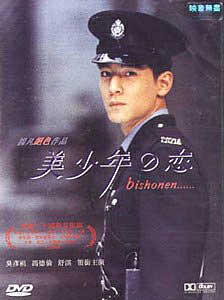Bishonen

Reviewed by YTSL
“He’s mindfucking you.” This is what one
young man in this 1998 movie tells another that he thinks a third individual
is doing to the second person. At times, I felt that this is what director
and scriptwriter Yonfan (also) was doing to the viewer(s) of that which takes
as its international title the Japanese word that translates into English
as “pretty boy(s)” (From “bi-”, short for “bijin”, and “shonen”, which refers
to young males). How else would one account for his having stated --
this according to Shelly Kraicer of the “Another Chinese Cinema Page” website
-- that he had made this romance-infused dramatic offering, one whose main
characters are all gay men who have some kind of personal connection with
one another, “for women (presumably heterosexual) who wanted to watch beautiful
young men”?

Similarly, I find myself wondering why it is that he -- whose full name is
Man-Shih Yonfan (but seems to prefer to just be referred to as Yonfan) --
opted for this very male-centered, largely Cantonese language production
to have a voice-over narration done by a Mandarin speaking female (Although
her name does not appear in the credits, Brigitte Lin has been identified
as having had this part in this Sylvia Chang executive produced film).
Then there is the seemingly over-long, drawn-out, circuitous and rather teasing
route that the viewers of BISHONEN... are taken before being properly introduced
to the character who I think is at the heart of this ultimately quite moving
effort: A straight arrow looking young man (sensitively portrayed by
then newcomer, Daniel Wu) who initially appears to be one half of a heterosexual
couple -- but actually is gay -- and gets named as Sam without it being revealed
until quite a bit later in the work that he was previously known as Ah Fai.

Something else that I have to admit to feeling disconcerted by is the fact
of BISHONEN... being undeniably generally aesthetically pleasing in terms
of its visuals -- and maybe also its score (though I found the sentimental
movie’s music to verge on being too sappy for my taste) -- even when quite
a bit of what is shown taking place in this work is rather psychologically
disquieting, emotionally messy and even downright ugly in terms of what gets
implied to have been done to certain individuals whose welfare the offering’s
viewers ought to find themselves caring for. And lest anyone wonder,
I’m actually am not referring here to: Pretty much all of the physically
attractive young people -- who include Terence Yin as the individual who
goes by the initials of K.S., and Hsu Chi in the supporting role of Sam’s
friend, Kana -- that are seen in the film not being heterosexual; and/or
three of them -- Jet (who Stephen Fung charmingly essayed), Ah Ching (who
I think was played by Jason Tsang) and Sindy -- being gigolos who are part
of what Hong Kongers would call a “duck shop” named S.M. Bay (operated by
a business-minded individual played by Cheung Tat Ming).

To some degree, it is tempting to superficially suppose that BISHONEN...
could not help but be a glossy looking work by way of it being helmed by
a director who made his mark as a fashion photographer prior to entering
the world of movie-making (and therefore may be better at getting a work
to look good than ensuring that the presented images fit the main mood and
themes of the film). However, in keeping with one of the primary points
of this thought-provoking production (for which David Chung is the credited
cinematographer and Sherry Kwok is the art director), I do suspect that there’s
more to this than initially meets the eye.

Appearances can be deceiving. This adage is particularly applicable
with regards to BISHONEN...’s principal character: Who, as his mother
noted, “wants so badly to be seen as good all the time”. Unfortunately
for Sam/Ah Fai, he -- like other humans -- could not be. Instead, the
young policeman -- who lived with and cooked for the parents (played by Kenneth
Tsang and his real wife, actress Chiao Chiao) he very obviously loved as
well as did not want to let down in any way (be it by being revealed to be
a smoker or homosexual) -- ended up with what was rather euphemistically
described by the movie’s seemingly omniscient narrator as a “double personality”,
and leading a double -- maybe even more -- life whose different strands ended
up coming together in ways that he could and did not anticipate.

When viewed from this perspective, the story of Sam/Ah Fai looks to be a
sad and cautionary tale about the tragedies that seem to invariably result
from a person’s doing things that cause him to feel guilt (not least because
he knows that it will cause others to have pain). However, this is
not to say that the atmospheric movie is entirely joy-less and that its chief
protagonist’s life was one that was completely love-less. Far from
it, in fact. Another point that I think is worth emphasizing about
BISHONEN... is how sincerely idealistic, innocently idyllic and rose-tinted-lens
romantic much of it did seem. Finally, and against some interesting
odds, I do think that Yon Fan and co. -- including the lead actors from whom
he successfully coaxed out some truly touching performances -- did manage
to get the message across that the kind of love that some people consider
to be just plain wrong is one that others can endow with much purity and
great beauty.
NB - cameos come in the form of James Wong (a
client), Paul Fonoroff (on the street), Joe Junior (the photographer) and
Ng Hong-ning (as a rough customer).
My rating for the film: 7.






